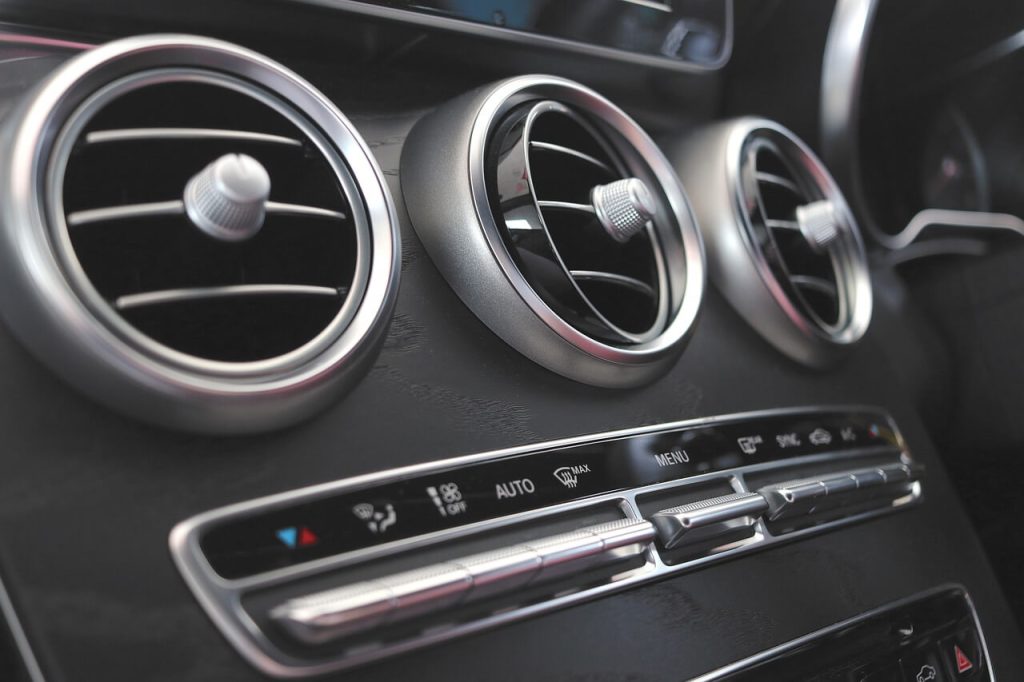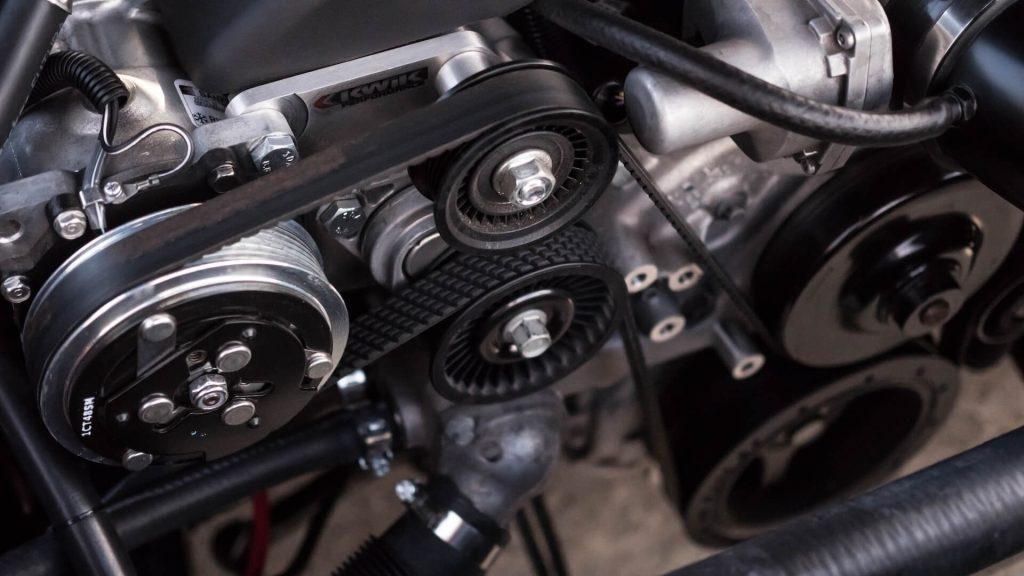Last Updated on June 21, 2023 by Mark S. Taylor
Are you hearing a hissing sound coming from the air conditioning system in your car? It can be rather annoying and point to a problem that needs to be fixed. In this post, we’ll look into the reasons why a car’s air conditioner starts to hiss and provide you workable fixes. So let’s get started and learn how to fix this bothersome issue.
Concern should be expressed if your car’s AC system starts to hiss. It can be a sign of a deeper problem that needs to be resolved right now. Ignoring this noise could cause the AC components in your automobile to become even more damaged, necessitating expensive repairs. Therefore, it is essential to pinpoint the root reasons of the hissing sound car AC and come up with workable solutions.

Contents
Common Reasons for Hissing in a Car’s AC
Unreliable AC Compressor
A malfunctioning AC compressor is one of the main causes of a hissing sound coming from the car’s air conditioner. By pressurizing the refrigerant, the compressor is essential to the cooling process. The compressor may hiss if one or more of its internal parts wears out or is damaged.
Leak of Refrigerant
Another frequent reason for a hissing sound coming from the car’s AC system is a refrigerant leak. Throughout the AC system, the refrigerant circulates and aids in chilling the air. As the pressure decreases due to a leak in the refrigerant lines, a hissing sound may be produced.
Expansion Valve Blocked
The evaporator coil’s flow of refrigerant is controlled by the expansion valve. A hissing sound may result from the refrigerant flowing irregularly if the expansion valve becomes blocked or jammed.
Broken AC hoses
The refrigerant is transported by the AC hoses between different AC system parts. These hoses may hiss as a result of cracks that form over time or leaks. In order to avoid further problems, damaged AC hoses should be replaced or repaired right away.
Defective AC condenser
The AC condenser aids in cooling the refrigerant’s heat. The AC system may malfunction and make a hissing noise if the condenser is broken or clogged with debris.
Obstructed AC filter
The airflow is restricted by a blocked or dirty AC filter, which makes the AC system work harder. This additional stress may produce a hissing sound. For the AC to function at its best, the filter must be cleaned or changed on a regular basis.
Identifying the Hissing Noise
It is advised to seek the help of a trained mechanic to determine the precise reason of the hissing sound car AC. To find the source of the issue, they will thoroughly inspect the AC system, look for leaks, check the compressor, and test each component.
How to Eliminate Hissing from the Car AC
The issue can be resolved once the source of the hissing sound car AC has been identified. You can take the following actions:
Step 1: Examine the AC compressor.
If a malfunctioning AC compressor is the cause of the hissing noise, it could need to be replaced. The condition of the compressor can be evaluated by a qualified mechanic who can then decide if a repair or replacement is required.
Step 2: Inspect for Leaking Refrigerant
The broken lines or parts need to be replaced or repaired if there is a refrigerant leak. The refrigerant can be replaced to the recommended level once the leak has been rectified.
Step 3: Clean or replace the expansion valve
An suitable AC cleaner can be used to clean an obstruction or clog in the expansion valve. The valve might need to be replaced if it is seriously damaged.
Step 4: Inspect the AC Hoses Check each AC hose for cracks, leaks, or other damage indicators. The hoses should be checked for problems and fixed or replaced as necessary.
Step 5: Check the AC Condenser
The cooling process can be hampered and accompanied by a hissing sound car AC if the condenser is damaged or clogged. Condenser cleaning and dirt removal can aid in restoring good operation.
Step 6: Replace or clean the AC filter
The AC filter needs to be cleaned or changed if it is clogged. This guarantees unhindered ventilation and keeps the AC system from being overworked.

Why Does My Car’s AC Hiss After Turning Off the Engine?
You can hear a hissing sound emanating from your car’s air conditioning system after you turn off the engine. Although this occurrence can be confusing, there is a rational reason behind it. Let’s look at the causes of your car’s AC hissing after the engine has been turned off.
The equalization of pressure within the AC system is one of the main reasons of this occurrence. The refrigerant is pressurized to chill the air when the AC compressor is operating. However, the compressor stops operating when the engine is turned off, and the pressure inside the system equalizes. The hissing sound car AC that you hear is the result of the equalization procedure.
The expansion valve is another element that adds to the hissing noise. The expansion valve controls how much refrigerant flows into the evaporator coil. The valve remains open after the engine is turned off as it gradually shuts. The refrigerant pours through the valve when it closes, producing a hissing sound car AC.
It’s crucial to remember that this hissing sound car AC after engine shutoff is usually innocuous and doesn’t signify any serious problems with your car’s air conditioning system. However, it is advised to get your AC system inspected by a qualified expert if you experience any other unusual symptoms or if the hissing sound lasts for a lengthy period of time.
Why Doesn’t My Car’s AC Cool?
It might be annoying when your car’s air conditioning system doesn’t work, especially in the summer when it’s hot. There are various things that can cause this problem. Let’s look at some typical causes of poor cooling in automobile air conditioners.
Refrigerant Leak: One of the most frequent reasons for inadequate cooling in auto air conditioning systems is a refrigerant leak. Leaks cause the refrigerant level to drop, which reduces cooling effectiveness. To stop the leak and replenish the refrigerant to the proper amount, professional examination and repair are required.
Faulty Compressor: The pressurizing and system-wide circulation of the refrigerant are done by the AC compressor. It’s possible for the compressor to malfunction or be damaged, which would result in inadequate cooling. A skilled expert can identify the problem and decide if the compressor needs to be repaired or replaced.
Condenser Blockage: The AC condenser is essential for removing heat from the refrigerant. The condenser can become clogged with dirt, debris, and other impurities over time, making it more difficult for it to adequately cool the refrigerant. To regain proper cooling, routine maintenance or expert repair may be necessary.
Blower motor malfunction: The blower motor propels cool air into the interior. Reduced airflow and subpar cooling effectiveness may be caused by a defective or underperforming motor. There may be a need to fix or replace the blower motor.
Electrical Problems: Electrical issues, such as defective wiring or a broken AC control module, might prevent the AC system from operating as it should. A skilled mechanic or electrician can identify and fix these problems.
Filters that are blocked or dirty restrict airflow into the air conditioning system, which lowers the cooling efficiency. The performance of the cooling system can be enhanced by routinely cleaning or replacing the air filters.
Consult a qualified expert as soon as your car’s air conditioner stops cooling effectively so they can accurately identify the problem and make the required repairs to get your car’s air conditioner working properly once more.
Read More: Fix Portable Jump Starter – Easy Steps to Resolve Issues
Why Does My Car Noise When the Air Conditioning Is On?
When the AC is running in your automobile, hearing strange noises can be frightening. Let’s examine some typical causes of car noises when the AC is on:
Problems with the belt: The engine of your car’s engine powers the AC system. When the AC is turned on, a worn, slack, or out of place belt may make a screaming or chirping sound. This problem can be solved by routinely inspecting and replacing the belt.
Problems with the AC compressor: A malfunctioning or failing AC compressor can make a variety of noises. If there is a grinding or rattling noise, the compressor clutch or internal parts may be malfunctioning. The AC system may become even more damaged if the issue is ignored.
Problems with AC Fans: When AC condenser cooling fans are worn out or out of balance, they occasionally make noise. A buzzing or whirring noise may point to issues with the fan. To fix these problems, a professional inspection and repair are required.
Issues with the refrigerant: Insufficient or polluted refrigerant might make the air conditioning system work harder and produce odd noises. For the AC system to operate at its best, it is essential to maintain the correct refrigerant levels and guarantee its purity.
Ductwork Issues: Damaged or faulty ductwork can result in air leaks, vibrations, and noise when the air conditioner is on. To get rid of these noises, the ducting may need to be professionally inspected and repaired.
It is advised to get your AC system evaluated by a skilled technician if you hear odd noises when the AC is functioning in your automobile. They are able to identify the precise problem and carry out the required fixes to return the system to trouble-free, quiet functioning.
How Can I Check the Refrigerant Level in My AC?
For the air conditioning system in your automobile to operate at peak efficiency, the refrigerant level must be checked. Here is a step-by-step method on checking the refrigerant level in your air conditioner:
Safety Precautions: Ensure that the car is parked on a level surface with the engine off. To protect yourself, put on gloves and safety goggles.
Find the Service Ports: There are two service ports on the AC system: one for low pressure and one for high pressure. To find their precise positions, see the owner’s manual for your car.
Locate the Low-Pressure Port: The AC system’s larger diameter tubing is normally where you’ll find the low-pressure port. Typically, it has a “L” or “LOW” designation on it. To this port, attach the low-pressure gauge hose.
Connect the Gauge: Firmly insert the low-pressure gauge hose’s end onto the low-pressure port to complete the connection. installed to avoid any refrigerant leakage, make sure it is.
Start the engine and the AC system, then check the gauges. Allow it to run for a while so that it can settle. Check the refrigerant level by reading the gauge on the low-pressure pipe. If the level is within the suggested range, the gauge will show it.
How to Read the Gauge: The refrigerant level is shown by color-coded zones on the gauge. The refrigerant level is adequate if the needle is in the green area. It may be necessary to recharge the refrigerant if it reaches the red zone, indicating that it is low.
Professional Inspection: It’s crucial to keep in mind that the refrigerant level must be checked first. It is advised to speak with a trained technician for an accurate assessment and any required repairs or recharging.
Keep in mind that handling refrigerant demands the right training and tools. To avoid any potential risks or harm to the AC system, it is preferable to get professional assistance if you are hesitant or uneasy completing the inspection yourself.
What Noise Does a Faulty AC Compressor Make?
Different sounds can be produced by an AC compressor that isn’t working properly, signaling a potential problem with the part. Here is a possible sound of a malfunctioning AC compressor:
Loud Clanking or Rattling: When the AC compressor is turned on, it may make a loud clanking or rattling sound. This noise may be the result of a damaged compressor clutch or loose internal parts.
Squealing or Screeching: A compressor belt that is worn out or out of alignment may make a high-pitched squealing or screeching noise when the air conditioner is turned on. When the belt slides or rubs against other parts, this happens.
A faulty air conditioning compressor may make a grinding or growling noise. This noise typically comes from the compressor’s worn-out bearings, which is a sign of internal deterioration.
A malfunctioning AC compressor occasionally produces a buzzing or humming sound. Electrical problems or defective compressor parts may be to blame for this noise.
It’s crucial to take immediate action if you hear any of these noises coming from the AC system in your automobile. The AC system may get even more damaged and may experience other issues if a malfunctioning compressor is left in operation. It is advised that you have a qualified mechanic check out your vehicle so they can precisely determine the state of the AC compressor and make the required repairs or replacements.
How Can an AC Expansion Valve Be Checked?
Since checking the AC expansion valve necessitates specific equipment and knowledge, it is best left to a trained professional. However, it is helpful to comprehend the fundamental procedure at play. An outline of checking an AC expansion valve is provided below:
Diagnoses: The technician will conduct a thorough evaluation of the AC system before testing the expansion valve. This include analyzing system functionality as a whole, gauging refrigerant pressure levels, and determining cooling effectiveness.
Visual Inspection: The expansion valve will be visually inspected by the technician for any indications of damage or leaks. They will check for wear, corrosion, or loose fittings on the valve body, connections, and ancillary parts.
Pressure Testing: The technician will carry out pressure tests to accurately evaluate the expansion valve’s performance. In order to do this, the proper ports in the AC system must be connected to pressure gauges, and the pressure readings must be observed.
Temperature Differential Test: To assess the cooling capacity across the expansion valve, the technician could conduct a temperature differential test. They can assess the valve’s functionality by observing the temperature difference between the input and exit sides.
Replacement or Repair: The technician will decide whether to replace or repair the expansion valve in light of the diagnostic results. To guarantee optimum AC function, it is frequently advised to replace a faulty or damaged valve with a new one.
It’s crucial to note that skilled professionals should be used for AC system diagnostics and repairs. Without the right knowledge and tools, checking or repairing the expansion valve could cause more harm to the AC system. For any expansion valve-related problems, consulting a skilled specialist ensures correct assessment and suitable remedies.
Please be aware that particular instructions may change depending on the make, model, and year of your vehicle and that the information supplied is solely for general knowledge purposes.
Conclusion
It can be upsetting to hear a hissing sound coming from the air conditioner in your car, but with the right diagnosis and prompt action, you can fix the problem. You may have an efficient and silent AC system in your automobile by taking care of the typical problems, such as a broken AC compressor, refrigerant leaks, blocked expansion valves, damaged AC hoses, and clogged AC filters.
